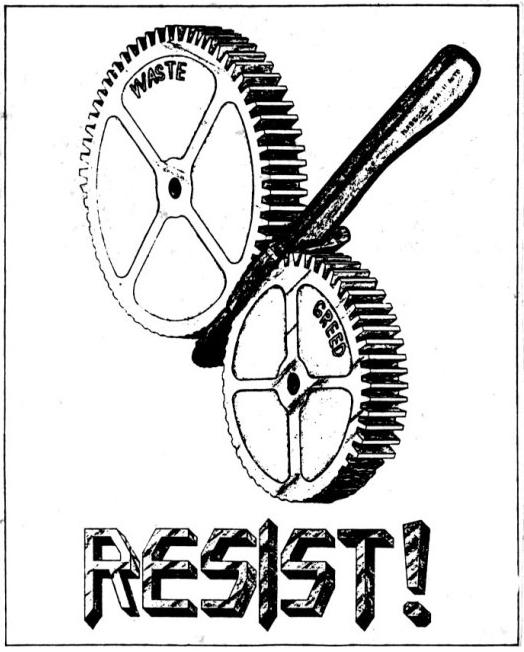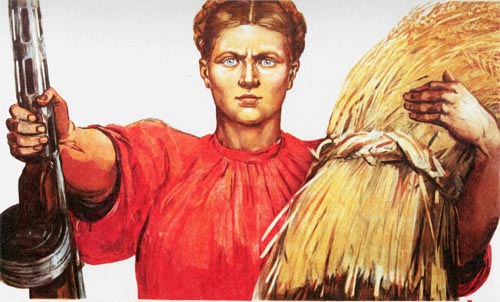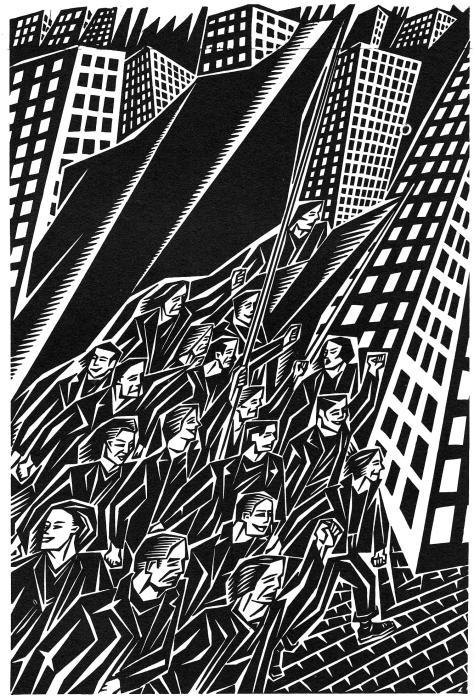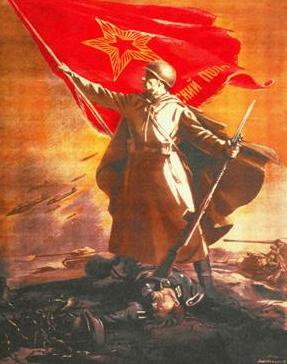|
|||||||||||||
Anarcho-Syndicalism versus Vol. 1: On Creating the
Post #01
Greetings, While researching Maoist and Leninist ideology online, I found myself at your webpage and reading the delightful ideas of revolution. However, I don't share your same type of thinking in Maoism. The political party, in our century and those past, has either been the people's greatest enemy, or our greatest traitor. Liberal governments prohibit torture in their constitutions, and then fly prisoners to other countries to expose them to burns, hot iron, and other inventions of the Inquisition. [*1] A shoplifter of a $2 loaf of bread serves more time in prison than a CEO responsible for stealing millions from the public. America and Europe engaging in wars that actually make the civilian populations less safe. [*2] And everywhere, there is the rule of Capitalism. At one point, the land beckoned humanity, told us to come to it, to pull wealth out of it, and to make it our own -- but today, it simply says "No Trespassing. Violators will be prosecuted." This is the situation of our factories, our mines, our farms, and our entire world. No longer do men and women work these lands, because someone who owns them doesn't see enough profit in it. Instead, they starve in the street, waving a sign that says "Will Work For Food." This is the language of our modern era: right next to empty fields, there are those begging to farm and create their own sustenance. This has been the tragedy committed by all Liberal, Authoritarian, Fascist, and Monarchical governments. But when we look at the political parties that have tried to oppose this, the record is even more dismal. The Labour Party of Britain threw their laborers into the Capitalist war. [*3] During World War 1, the Socialist Parties of France and Germany were supportive of their own governments. [*4] It was worker-of-the-world slaughtering worker-of-the-world! In the 90's, the Hungarian Socialist Party took public assets and privatized them [*5] -- once again, the reds are looking out for the cause of Capitalism. In the 1970's, Portuguese Communist and Socialist Parties worked together to rewrite the nation's constitution, which urged the state to "socialize the means of production and abolish the exploitation of man by man." [*6] After a few years, though, Conservatives gained power and completely scrapped the "ideological language," -- language which existed only as an abstract, unworkable concept; it was not something that they even attempted to bring into reality. [*7] And then look at Authoritarian Parties of Socialism, from the Chinese Communist Party, to the one in Cuba, or Russia, or Vietnam, or Laos. We should be very aware that these places are the worker's hell. The right to organize, to form unions and strike, is completely prohibited. And those who do, in spite of the laws, are executed, imprisoned, and given harsh sentencing. According to Marx, I have been alienated by the means of production by not being able to work it. [*8] But in his governmental systems, I have become even more alienated -- I can't unionize, I can't strike, I can't speak, I can't read, or write, or think. And now I'm told that this is freedom. Whether it was Mao or Xiaoping, Lenin or Stalin, these political parties have always hunted and abused the people. Why would the Bolshevik Party, under Lenin's rule, abolish the right for Jews to use the Hebrew language? [*9] Why would the Chinese Communist Party, under Mao's rule, burn books and prohibit certain styles of music? [*10] It is an absolutely maddening system. In every way, the good, common people have been disarmed by a government that seeks to become their new Capitalist class. I do not look to Maoism as a solution; it is just another attempt to use "the right ideas" in enforcing government. If you are genuinely interested in the workers, the common people, and our struggle for liberty, then look to the past where we have succeeded. Workers in Barcelona, 1919, went on strike and achieved the first National Eight Hour Day. [*11] Strikes in Syria overthrew French rule there in the 1930's. [*12] Similar activity of unions in Algeria accomplished the same goal by the 1960's. [*13] Polish trade unions went on strike and eventually achieved self-governing autonomy in 1989 from the Soviets. [*14] And much earlier, in 1917, even the General Strikes of St. Petersburg convinced the military to defect to the side of the revolution [*15] -- it was striking that brought down the Tzar, and Lenin's coup against the worker-managed society that brought up a new one. Massive unrest and General Strikes against governments and Capitalism in Bolivia, [*16] New Guinea, [*17] India, [*18] Korea, [*19] and every spot of the globe. This is what has brought governments crashing to the ground; this is what has bent the Capitalist at their knee. The workers' union, and the General Strike. This is the tool that has achieved our liberty in the past, and it will be the tool the achieves it in the future. There is a piece of yours I read: "We need to sum up a century of revolutionary strategies and attempts, victories and defeats instead of the conventional wisdom and facile verdicts that paralyze our movements." Well, there is a quote that fits political parties perfectly: "If you do what you've always done, you'll get what you've always gotten." (Anthony Robbins) [*20] If we know what has worked, and what certainly doesn't, why would we waste any more time on Mao or similar butchers of the people? Their revolutionary party never changed anything -- it only brought about a new, Capitalist class that continued to exploit and oppress the people. Of course Mao banned unions and worker organizations -- he fears us, because he's one the greatest Capitalists of history, and we're the only thing that could've stopped him. One quote of yours was interesting: "To take this road, we need a fearless, open-eyed debate, discussion and engagement. We need fresh analyses of the rapid changes shaping the world around us." I am ready to engage in any discussion on creating liberty -- that is, real, true freedom, that allows you to work the ground and be the possessor of what you've created, that makes every person their own governor and liberator -- we need Anarchy. Please, we should discuss Anarcho-Syndicalism as a revolutionary path for creating a society managed by the workers, without the state or the capitalist. I patiently await your reply... Andy Carloff, Resources *1. TruthOut.Org, "The CIA's Torture Flight Travel Agent," TruthOut Page.
Post #02
Andy, Thanks for posting your thoughts here. Much of what you have to say is familiar to me from my own long years in the anarchist movement. To introduce myself, I am a former anarchist and a Kasama supporter but I do not consider myself a Maoist. I think the Chinese Revolutionary experience is an incredibly rich one and that Mao made important major contributions to revolutionary theory and practice as well as very costly errors. My basic view is that while we have much to learn from this and other historical experiences (including those of the anarchist movement of course) that we are fundamentally confronted with having to create something genuinely new. There is much to respond to in your comments. I'll leave a lot of that to others here. One of the things that strikes me in your comments though is the failure to confront the repeated defeats and failures suffered by the anarchist movement. The idea that this is a history we can look back to to easily discover "what works" is refuted I think by the mass graves of anarchist workers killed in Spain. If the Russian, Chinese and other experiences of socialist revolutions in the 20th century ultimately produced repressive political regimes that led to the restoration of capitalism, the anarchist movement bears another legacy, that of heroic uprisings ending not in "workers liberty" but in bloody defeats. This is not to disparage those heroic uprisings, but rather to suggest that our responsibility to those who fought and died before us is to be ruthless in learning from their mistakes. What this all suggests to me is that the answers to the question of what it will take to realize the classless stateless society that we here call communism are not just lying around to be picked up from one tradition or another. We have roughly a century of experience now with several variations on Lenin's vision of a revolutionary vanguard party. Like a lot of technologies that are a hundred years old it has revealed a lot of serious limitations, but I would suggest that a serious and all-sided analysis of both the positive and negative of those experiences is the best place to start in trying to conceive of new organizational forms appropriate to new conditions but also informed by the lessons of previous experiences. One of the complications that confronts us is that while we know the dangers that the Leninist conception of the party poses, many of the reasons that gave rise to it in the first place are still very important considerations. The need for an organizational form that could concentrate the consciously revolutionary minority and survive state repression, that could ensure unity in action if not in thought, that could sum up its own defeats and develop new analyses and change course under conditions of great tumult -- these were and remain pressing needs. They are precisely why if you look at the early history of communist parties around the world following the Russian Revolution that you find them filled with former anarchists from Lucy Parsons to Mao Ze Dong himself, committed revolutionaries who had learned through bitter experience that relatively open forms of mass organizations like unions, no matter how militant and revolutionary minded most of their members were, could not actually "bring the capitalists to their knees" on their own. I'm not here to try to convince you of the necessity of repeating the experiences of the Leninist party. As I've said I think we need something genuinely new. Rather I am suggesting that you make as cold and unsentimental an appraisal of what Anarcho-syndicalism has actually won in any lasting way as you think you have of the experiences of the Chinese Communist Party in order to properly appreciate the contradictions and difficulties that lie before us. In any event, welcome to this discussion.
Post #03
Andy, If you are really interested in this discussion you might want to check out a piece I wrote a long time ago when I still considered myself an anarchist. It was republished here a while back, but feel free to add your two cents should you be so moved: The Historical Failure of Anarchism
Post #04
Greetings, And thank you for bringing me into the discussion...
Lenin's vision changed all throughout his life. He supported elections, campaigning, and the right to vote for every single moment that he was a revolutionary -- but upon becoming a head of state, these things suddenly became identified with Capitalism and Imperialism. I'm suspecting that his change of opinion had much more to do with the fact that he lost the vote of the people. [*1] Russian workers had decided on a Revolutionary Socialist government, but Lenin made up his mind: the biggest threat to the Russian worker, is the Russian worker. [*2] For instance, look at Lenin's text "Democratic Tasks of the Revolutionary Proletariat," Proletary, No. 4, June 17 (4), 1906. Here, he advocates the right to vote, but when the Russians voted for a different Socialist, they became his mortal enemy. Once he was in office his ideology had completely reformed. Anyone who had gone along with him from the beginning, like the Kronstadt sailors, or the Socialists, were repressed, imprisoned, and executed. They had followed Lenin, because they believed in his plea for free elections; but then they were slaughtered by him, when they resisted his dictatorship. To quote the Anarchist Peter Kropotkin, "If you took the most ardent revolutionary, vested him in absolute power, within a year he would be worse than the Czar himself." Considering the evolution of the Russian prison system from the Tzar to Lenin [*3], Kropotkin hit the nail right on the head. In this respect, I don't regard Lenin as anyone with new ideas, or a genuine revolutionary. I consider him exactly as his acts would make you consider him -- he's an opportunist politician, who signed the death warrants of those who supported his party and brought him to power. Actually, the union has done quite exactly that. In 1919, the Anarchist-Syndicalist CNT-FAI organized a General Strike against Capitalism and the state. And it succeeded. It brought about the first, national eight-hour workday, as well as releasing hundreds of revolutionaries from prisons. [*4] This was in 1919, after violent and brutal police repression, and without so much as a single dime dropped into anyone's campaign fund. Mao gained political power of China in 1951, but he didn't enact the Eight Hour Day until 1960. [*5] Even with complete political power over a country, unions are still more effective than Mao as a dictator -- they are still stronger and more capable of granting the workers our rights. Yes, Mao had the philosophy of the "People's Liberation Army," with millions of soldiers, and endless prisons-- but all of the political power in the world did nothing to bring about the Eight Hour Day. In so-called 'Communist' China, Workers' rights in general languished, suffered, and many were ultimately abolished.
1917 was the St. Petersburg General Strike that brought down the Tzar. [*6] 1920 was the German Kapp Putsch Strike, which brought down a monarchist uprising. [*7] 1936, Syrian General Strike ousts French imperialists from the country and creates independence (good thing they ignored Lenin's ideas about "Imperialism"). [*8] Same year, CNT-FAI, an Anarchist Federation of Labor, resists a Fascist Coup -- they were ultimately defeated, however, when they agreed to cooperate with Leninists and Marxists (Orwell's book "Homage to Catalonia" covers it very well). [*9] Even after being exiled from Spain, the CNT-FAI Anarchists were the most important veterans and organizers of Anti-Fascist resistance in France, [*10] Italy, [*11] and Yugoslavia. [*12] 1946, the Royal Indian Navy Mutiny, coupled with massive strikes, creates national independence of India. [*13] 1968, French General Strike topples federal government. [*14] 1984, Uruguayan General Strike removes a military dictator. [*15] 1989, Polish strikers overthrows Soviet rule in Poland, leading to national autonomy after the "Polish Round Table Talks." [*16] 2007 Guinea General Strike [*17], 2009 French Caribbean General Strike, [*18] 2005 Bolivian General Strike, [*19] etc., etc., all have toppled corrupt governments or have cut off the tentacles of the Capitalist monster. Even going back to Ancient Rome, when the plebeians would engage in the Secessio Plebis -- two thousand years ago, and even then the General Strike brought the Roman Empire to its knees? [*20] This is definitely the tactic I want to use, just because it works! Martin Luther King and the Civil Rights Movement may have been a "bloody defeat," but it created a lasting social harmony. King was influenced by thinkers like Gandhi, [*21] and Tolstoy, [*22] both of whom had openly advocated Anarchist organization for the purposes of achieving social justice. [*23] In fact, King may have gotten some of his ideas from a Canadian General Strike following World War 1 -- being beaten in the streets, attacked by police, and thrown into prisons was what brought about the right to organize for workers in Canada. [*24] All liberty, it seems, requires a little bit of suffering, of course. But, I am mostly concerned that the suffering I'm enduring will just create another dictatorship -- in which case I was only betrayed. But, the people aren't betrayed by their governments, so much as we betray ourselves. This type of social organization, the union and the general strike, has worked in creating rights for the workers and the people. Why persist with political parties? Thank you. Sincerely, Resources *1. "Lenin and the First Communist Revolutions, IV," The Russian Coup d'Etat: November, 1917, Economics.GMU.EDU Page. The Socialist Revolutionaries polled 40.4%, while the Bolshevik Communists polled only 24.0%. *2. "The Bolshevik revolution, 1917-1918: documents and materials," by James Bunyan and Harold Henry Fisher, chapter 7: The Constituent Assembly, 1934.*3. "Stalin: Breaker of Nations," by Robert Conquest, page 51, Penguin Books, 1994. *4. "1919: La Canadiense and Barcelona general strike," by Steven, Sep 10 2006, LibCom Page. *5. "NPC deputy calls for 6-hour working day," China.org.cn by Zhou Jing, March 19, 2008, China Internet Information Center. *6. "The Russian Revolution," by Alan Moorehead, chapter 9: the Rising, March, 1917; Harper and Brothers Publishing, New York, 1958. *7. "Germany," by Marshall Dill, Jr., edited by Alan Nevins, published by the University of Michigian: History of the Modern World, 1961, pg. 281. *8. Commins, David Dean. Historical Dictionary of Syria, page 113. Scarecrow Press, 2004, ISBN 0810849348. *9. Burnett Bolloten The Spanish Civil War: Revolution and Counterrevolution UNC Press, 1991 ISBN 0807819069, 9780807819067. Chapter 64 "Segismundo Casado, Cipriano Mera and the Libertarians." *10. Jackson, Julian (2003). France: The Dark Years, 1940-1944. USA: Oxford University Press. ISBN 0199254575, page 495. *11. "War in Italy, 1943-1945: A Brutal Story," by Richard Lamb, published by Da Capo Press (March 21, 1996), ISBN-10: 0306806886, page 203. *12. Ciglic, B. and Savic, D., Dornier Do 17 The Yugoslav story, Operational Record 1937-1947. Jeroplan, Belgrade, 2007. ISBN 978-86-909727-0-8; Thomas, N., Abbot, P. and Chappell, M. Partisan Warfare 1941-45 Osprey, London, 2000. ISBN 0 85045 513 8. *13. "'The Tribune: RIN Mutiny - The lesser known mutiny," Trilochan Singh Trewn, Sunday, February 24, 2002, TribuneIndia Page. *14. "The Beginning of an Era," from Situationist International No 12 (September 1969). Translated by Ken Knabb, CDDC.VT.Edu Page. *15. Rex A. Hudson and Sandra W. Meditz, editors. Uruguay: A Country Study. Washington: GPO for the Library of Congress, 1990, Section: "History - THE MILITARY GOVERNMENT, 1973-85 - The New Situation, 1973-80." CountryStudies.us Page. *16. "Pushing back the curtain." BBC News, Poland 1984 - 1988, BBC Page. *17. "Guinea police clash with strikers", BBC News, January 22, 2007, BBC Page. *18. Gill, Lucy (2009-03-19). "French Divided by Strikes". BBC News. BBC Page. Fidler, Richard (2009-03-19). "Guadeloupe: General strike scores victory, spreads to other colonies". Green Left Online (Green Left Weekly). Archived from the original on 2009-06-22. Web Citation Page. *19. "Bolivia sees anti-reform protests," BCC News, Saturday, 9 September 2006, BBC Page. *20. M. Cary, H.H. Scullard (1980). A History of Rome. ISBN 0333278305, page 66. *21. King, Jr., Martin Luther; Clayborne Carson; Peter Holloran; Ralph Luker; Penny A. Russell (1992). The papers of Martin Luther King, Jr.. University of California Press. pp. 135–136. ISBN 0520079507. *22. Murthy, Srinivas.Mahatma Gandhi and Leo Tolstoy Letters. Long Beach Publications: Long Beach, 1987. *23. "Kingdom of God Is Within You," by Leo Tolstoy; and Bharatan Kumarappa, Editor, "For Pacifists," by M.K. Gandhi, Navajivan Publishing House, Ahmedabad, India, 1949. *24. Bercuson, David Jay (1990). Confrontation at Winnipeg: Labour, Industrial Relations, and the General Strike. Montreal & Kingston: McGill-Queen's University Press, page 62, ISBN 0773507949.
Post #05
Seems interesting, I'll definitely check it out. It seems odd, though, that you would be Anarchist and, also, at the same time writing an essay against Anarchism? It just reminds me of whenever a preacher or pastor starts off by saying, "I used to be Atheist, too!" Well, you got me, sir, because I used to be a State Communist. The Anarchist world is a dream, and the Leninist world has always been a nightmare. Are you saying you'd rather succeed in your nightmares than fail at your dreams? Andy Carloff,
Post #06
Andy, Just to be clear, I wrote the piece when I still considered myself an anarchist. Not surprisingly it convinced many that I really wasn't and eventually I too came around to that view. The article was an attempt to confront what I regarded as a profound ossification of anarchist theory and general refusal to confront historical defeats and failures honestly but from within an anarchist framework. Ultimately I came to the conclusion that the framework itself was inadequate. I could very easily write an article today called "The Historical Failure of Marxism." But such an article would not have the same meaning precisely because Marxism subjects its failures and defeats to ruthless critical analysis in ways that anarchism really doesn't. In short I wouldn't be saying anything that many Marxists haven't said already. This is not to say that many many Marxists do not have such a critical view of their own history, only that the Marxist criticism of the failures and defeats of the Russian, Chinese and other revolutions is much much richer than any comparable anarchist literature on Spain. I'm not particularly interested in arguing here over Lenin's character. I simply think that if you don't take his positions, whether right or wrong, seriously as flowing from a commitment to human emancipation you are going to fall into facile dismissals that only serve to deprive you of the insights to be gained by treating them as sincere. A book that you might want to check out on all this is Victor Serge's excellent "Year One of the Russian Revolution" (its available online at: Marxists.org Page ). It was very important in forcing me to rethink my views of Lenin which were very close to those that you express here. As you probably know Serge was an anarchist who went over to the Bolsheviks but who was ultimately forced into exile during Stalin's rise to power. The Trotskyists often lay claim to him, but it would be a big mistake in my view to see him through that lens. Finally, I do not deny the power of unions or general strikes to win demands or have an enormous impact on societies. I do deny their ability, in isolation, to overthrow capitalism and bring about a classless stateless society. They are tools in a toolbox, very useful for somethings but not for everything.
Post #07
Greetings again,
There are no insights to be gained from Leninism if it is one thing in 1906, [*1] another thing in 1917, [*2] and then finally a completely different thing in 1924. [*3] The only insight to be gained is that politicians are creatures of deception. John Locke, Rousseau, Plato, and Aristotle -- I'm certain that many of them were insincere and prejudiced. But despite this, I was still able to gain an extreme amount of insight from their works. If I'm supposed to gain insights from Lenin's works, all I've found were contradictions and lies, each specific to his situation at that time. And if I'm supposed to gain insights from his life, the only thing I can think of is this: do not overthrow a worker-managed society in favor of Marxist-enlightened dictatorship. Kerensky may have been a Liberal Socialist, but at least he let unions organize, seize industries, and manage affairs themselves, which is Real Socialism. [*4] If you've read Plutarch, you'll have a million more insights than anything you could possibly have read by Lenin. In fact, there's a character that Plutarch covers in Lives of the Great Romans and Greeks -- Pisistratus. A Greek politician, who claimed to be the defender of the common laborers. [*5] One day, he gouged out his own eyeball, and claimed he was attacked by the wealthy, Capitalist class. [*6] The people voted to give him guards to defend himself, and then he used the guards to make himself a dictator, and then prohibited freedom of speech, the right bear arms, etc.. [*7] Sounds exactly like Lenin: "Counter-revolutionaries are everywhere trying to overthrow my dictatorship of the proletariat, so I need to cut back on civil rights for the general population." [*8] But that's a political lesson from over a thousand years ago, and Leninism has made this failure its creed. So, whenever I hear Maoism, Leninism, or Stalinism, a bell rings in my head that makes a sound like "Pisistratus-ism."
The most effective tool for revolution shouldn't be in a toolbox, but in your hand! There is a difference between authoritarian and libertarian socialism -- not just in what they accomplish, but in the direction they end up. Statist Communism has never created liberty, or anything remotely resembling liberty. The idea that Statist Communists are "preparing the world for Communism" is equally absurd -- after all of Stalin's preparation in Russia, the fall of the Soviet Union should have landed Russia into a stateless, classless society. But, no, none of that happened. Instead, Russia became an unconstitutional, capitalist, statist, rogue state of the world. Thanks for preparing the proletariat to enter their new world, Lenin. After some seventy years of Socialist preparation, and only ending up with authoritarian Capitalism? That doesn't sound like a failure -- it sounds like it was working in the direction of authoritarian Capitalism. It sounds like giving the means of production to a political party is as bad as giving it to a capitalist class. The possession of this wealth has always corrupted its owner, whether that owner was left-wing or right-wing. This is the lesson that I take -- that when a few own everything, it is Capitalism, even if it calls itself Communism! It is even more so my enemy, because it commits blasphemy against the Social Revolution. It convinces the people, that Communist Revolution only means prisons, mass executions, and war. So when I talk to them next time about using unions to fight Capitalism, they can say, "No thanks, Mao. I like classical music too much. That, and keeping my family alive." The greatest deterrent to appealing the worker of industrialized nations to Socialism are the faults of political parties. Explaining the differences of class interests are easy. But they become difficult when the last person to explain them was also the world's greatest killer. There is nothing that can disperse people like violence, and nothing has achieved this like Maoism or Statist, Authoritarian Communism. And in the words of Mikhail Bakunin, "...there is no revolution without the masses..." [*9] Authoritarian Communism has not only failed in creating its objective; it has succeeded in recreating and bolstering the power of Capitalism. But cooperative and voluntary efforts at creating liberty have given us at least something. They are the source of virtually all of our liberties and opportunities. More than that, they have overthrown the state and the capitalist system, only to create the egalitarian societies. This was done in the Free Territory in Ukraine, but they were destroyed by Lenin's troops for resisting German, Monarchist armies. This free society existed in Catalonia, as well, until they submitted to a Leninist government, which executed and tortured its most active and vocal soldiers. But it was forces of a monarchy that also crushed the Paris Commune, so of course Lenin's government would crush a worker's paradise. It is a trend of political government. Quoting Mikhail Bakunin...
My choice in Anarcho-Syndicalism is that it has worked in the direction of creating liberty. Anarcho-Syndicalist societies were beautiful, wonderful places of freedom and workers' solidarity. Maoist, Leninist, Stalinist, Castro-ist, etc., societies have always been the workers' nightmare -- they have made Capitalism look welcoming, which is why there are so many seeking to flee. Anarchists created liberty, Leninists destroyed it. Anarchists abolished capitalism and created worker-managed society, Leninists fought and destroyed them. Anarchists created the eight-hour day, Leninists banned it. Before we can ask about whether one or the other succeeds, we should really ask another question... are they even really striving towards the same thing? Thank you, Sincerely, Resources *1. "Democratic Tasks of the Revolutionary Proletariat," Lenin, Proletary, No. 4, June 17 (4), 1906.
|








